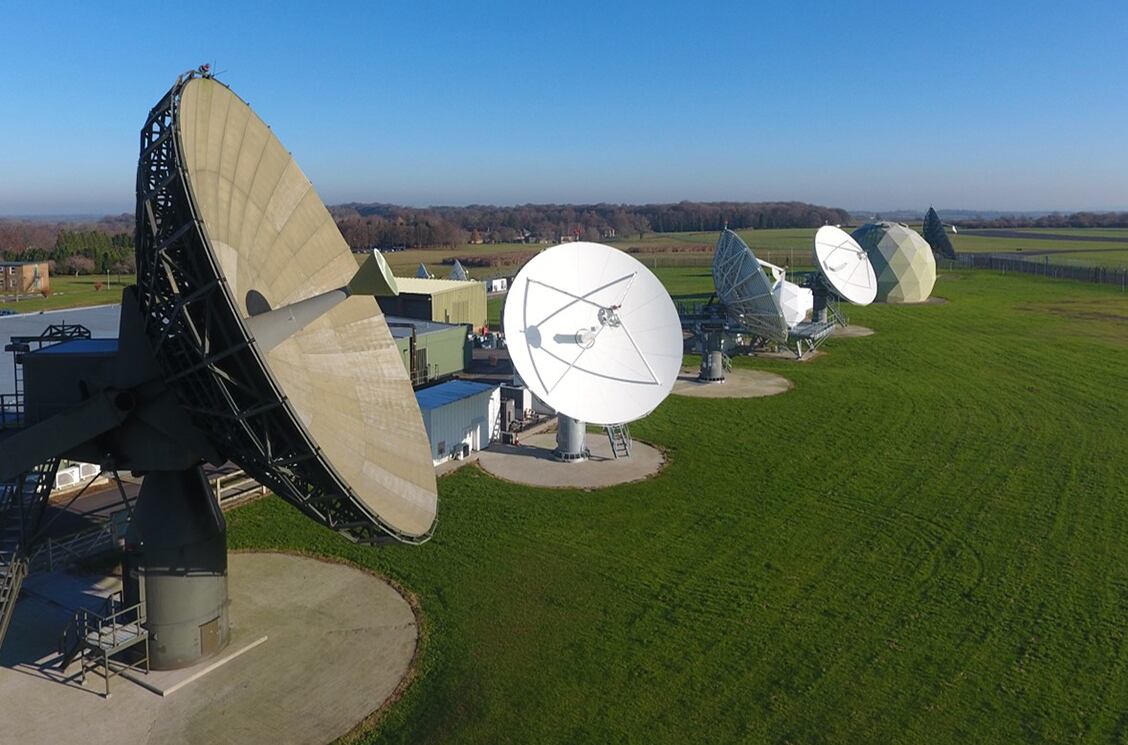LONDON – Viasat is upgrading Skynet satellite communications capabilities to enable the British military to comply with the latest integrated waveform requirement known as IW Phase 2, the company said on Feb. 8.
The deal was signed in the second quarter of 2020 but the UK arm of the Carlsbad, California-based communications company has only now been able to announce that it is undertaking the upgrade to ultra-high-frequency satellite communications network control stations in the Skynet system.
The upgrade is one in a spate of military-related space announcements in the last few days, which have seen the Ministry of Defence name its first Space Command boss and Lockheed Martin tie up with a rocket supplier for its first vertical launch from a UK spaceport.
The satellite communications contract was awarded by Airbus Defence and Space, the current private finance initiative operator of the Skynet satellites and associated ground control stations.
Airbus operates a clutch of Skynet 4 and 5 satellites and is building another spacecraft known as Skynet 6A.
The Airbus deal to operate Skynet nears its end, and the winner of a competition to operate the ground control stations beyond 2022 is expected soon.
Viasat is supplying its visual integrated satellite communications information, operation and networking software platform, known as Vision, to meet the IW Phase2 requirement.
Britain and its allies are in the process of switching to the new integrated waveform software in order to retain interoperability with U.S. military upgrades.
Last August, Viasat announced it had successfully used Vision in the upgrade of NATO satellite control stations to comply with the new requirement.
Viasat is not a newcomer to Skynet’s supply chain. Airbus has been using earlier versions of the company’s integrated waveform technology in the system since 2012.
Officials hope the upgrade will enhance mission situation awareness and operational insights on the communication system.
Steve Beeching, Viasat UK’s managing director said the upgrade is key to expanding Skynet capabilities.
“With Vision, the network operators will gain more assured, reliable, real-time communications capabilities to reconfigure UHF satellite networks to meet new tactical profiles—as battlefield and warfighter requirements dynamically expand and contract,” Beeching said.
The improved capabilities come at a time of increasing focus on military space by the British. Last year the British government acquired a stake in failed satellite constellation operator OneWeb as part of a deal to revive the operation.
Prime Minister Boris Johnson signaled space as a sector to watch when he announced in a speech last November that the government was intending to raise defense spending by an extra £16.5 billion, or $23 billion, over four years.
In total the British say they are going to raise spending in the defense sector by £24.1 billion over the period.
Space budgets are likely to be a major beneficiary, although details will likely have to await publication of a government integrated review of defense, security, foreign policy and overseas develop policy targeted for the spring.
A defense white paper about defense equipment plans is expected immediately following the review.
Conventional weapon programs are expected to be victims of cuts to make room for investments in space, cyber and other new technologies.
Defense space activities continue to progress here even without spending plan details being public.
Last week the MoD named Air Commodore Paul Godfrey as the first commander of the new UK Space Command.
Godfrey, soon to be promoted to Air Vice-Marshal, is no stranger to the U.S. military. His previous position saw him responsible for the planning and employment of coalition air and space power across the Middle East within the U.S. Air Force Combined Air and Space Operations Center.
Based at RAF High Wycombe, Space Command will be a joint command, staffed from all three arms of the military, the civil service and industry. It brings together under a single two-star military commander: space operations, space workforce generation and space capabilities.
Some of those capabilities may be enhanced by an announcement Feb. 8 that Lockheed Martin UK has contracted ABL Space Systems to launch a rocket from the Shetland Space Centre being created on Britain’s most northerly island.
ABL’s new RS1 rocket is set to become the first ever vehicle to vertically launch small satellites from the UK.
If the Lockheed Martin-led work, known as the UK Pathfinder Launch program, goes to plan, lift-off of the rocket from the Shetland island of Unst is set for next year.
Once the RS1 is in orbit the rocket will release a small launch orbital maneuvering tug built by Reading, southern England-based Moog.
The tug can deploy up to six miniaturized cube satellites. Two of the cubesats deployed will be Lockheed Martin’s own technology demonstration spacecraft.
The RS1 is currently in the final stages of development and a maiden launch is planned for the second quarter of this year from Vandenberg Air Force Base, California.
Andrew Chuter is the United Kingdom correspondent for Defense News.








